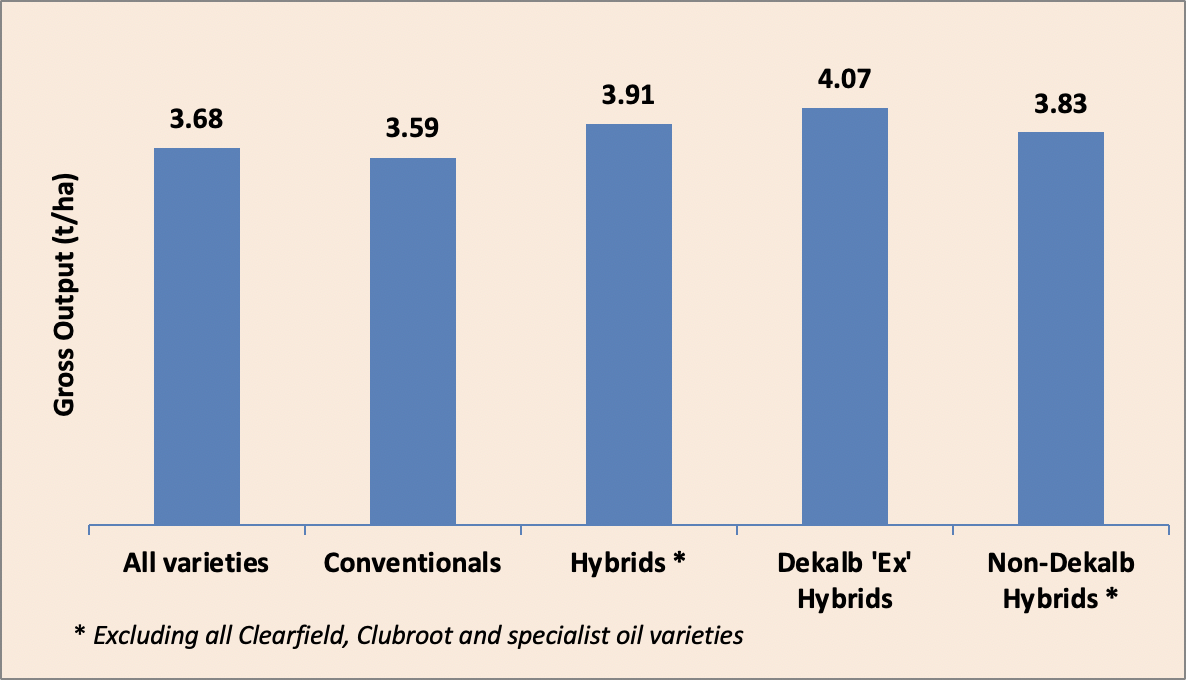Independent 2018 harvest results show hybrid WOSR advantage
24th April 2019
Hybrid winter oilseed rape out-performed conventional varieties by more than 0.3 t/ha on farm last season, according to benchmark independent harvest data just published.
Hybrid winter oilseed rape out-performed conventional varieties by more than 0.3 t/ha on farm last season, according to benchmark independent harvest data just published. What is more, the most robust hybrids showed an even greater a gross output advantage, at almost 0.5t/ha.
The industry-leading, 400 farmer participant Kleffmann Group GB WOSR AMIS® 2019 seed panel, carefully selected to be representative of British growers, secured 2018 farm yields and oil contents from more than 50 mainstream ‘double low’ varieties.
Excluding all Clearfield, clubroot resistance and specialist oil varieties for the most meaningful comparison, the gross output of the 34 mainstream hybrids included in the nationwide sample averaged 3.91t/ha against 3.59t/ha for the 21 conventional varieties. And the 10 most robust hybrids from the Dekalb breeding programme averaged 4.07t/ha compared with 3.83t/ha for the other 24 comparable hybrids (Figure)
Figure: 2018 Winter OSR Variety Performance on Farm
Source: Kleffmann Group GB WOSR AMIS® seed panel HY 2019
Interestingly too, the superiority of hybrids in general and the most robust hybrids in particular extended across all drilling dates, establishment regimes and soil types, underlined the reliability of the varieties concerned.
“This is hugely encouraging proof what our whole hybrid development programme is designed to do,” commented Dekalb breeder, Matthew Clarke. “Instead of putting gross output before everything else, we select varieties for a series of traits we know to be important in farm production. And we do so under the most challenging conditions. We then take forward the best-performing of these.
“Employing no fungicides on sites with the greatest disease pressures, for instance, has been our key to developing the most robust phoma and light leaf spot resistance. Drilling later than normal and into difficult seedbeds has allowed us to identify the most vigorous-establishing and fast-developing lines. Delaying harvesting on exposed sites has been vital in securing strong resistance to pod shattering. And testing widely at lower as well as standard nitrogen inputs is enabling us to develop varieties which lose less performance when nitrogen supply is restricted.
“This approach means our varieties tend not to come top of the tree in trials geared to out-and-out yield maximisation; especially when grown in small plots and to protocols designed to suit the average.
“However, our parallel plot and field-scale trial work under far more typical agronomic regimes in the UK and across Europe shows they perform especially reliably and robustly on-farm where it matters. Which is exactly what the 2018 harvest results underline.”

